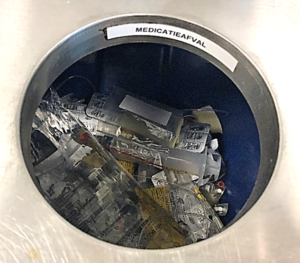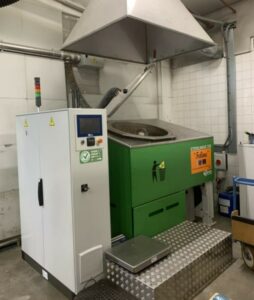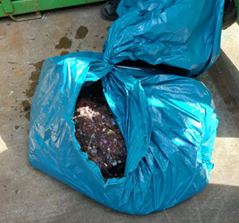Recycling medical waste in the healthcare sector presents significant challenges due to a wide range of barriers such as economic and legislative obstacles. However, University Medical Center Utrecht (UMC Utrecht), a hospital located in the Netherlands, has overcome some of these barriers. Recognized as one of the leading hospitals in the country for medical waste recycling, UMC Utrecht serves as a best practice example for hospital waste management. In light of their achievements, representatives from the Healthcare Plastics Recycling Council (HPRC) visited UMC Utrecht to observe their waste-handling practices and share the knowledge gained with their healthcare network.
Waste Management system at UMC Utrecht
UMC Utrecht’s waste stream consists of waste generated by three interconnected hospitals: UMC Utrecht, the Wilhelmina Hospital, and the Dutch Military Hospital. The three hospitals are connected with each other through an underground corridor system. Waste containers from these hospitals converge in a central hall where they are sorted and allocated to their respective waste streams. Combined, the three hospitals produce approximately 2.5 million kilograms of waste annually, of which 40% is recycled.
To enhance waste management, UMC Utrecht implemented separate collection systems for specific waste streams. In 2018, they began collecting Plastic, Metal, and Drink cartons (PMD) and organic waste (GFT) in public spaces and office areas. The hospital procured new waste bins for this purpose. Plastic waste separation in the operating rooms (ORs) commenced in 2018, followed by the rollout of source separation in laboratories and nursing wards in 2019. UMC Utrecht continuously improves its waste management program, which is overseen by a dedicated general facilities team comprising 45 individuals.
Source Separation
UMC Utrecht places great emphasis on informing and educating its employees about waste separation procedures. The process begins at the
point  of waste generation. A notable example is the medicine preparation room, where separate bins are provided for different types of medical waste, including paper, plastic, and contaminated waste. The hospital employs various color coding systems and informative posters to aid employees in the waste separation process. Additionally, UMC Utrecht ensures that its staff receives comprehensive information and training on proper medical waste handling within these rooms to minimize the risk of errors. Waste separation is also implemented in other areas, such as operating rooms, employee areas, and general spaces, excluding patient care rooms.
of waste generation. A notable example is the medicine preparation room, where separate bins are provided for different types of medical waste, including paper, plastic, and contaminated waste. The hospital employs various color coding systems and informative posters to aid employees in the waste separation process. Additionally, UMC Utrecht ensures that its staff receives comprehensive information and training on proper medical waste handling within these rooms to minimize the risk of errors. Waste separation is also implemented in other areas, such as operating rooms, employee areas, and general spaces, excluding patient care rooms.
Once waste from different hospital departments is separated, it is moved to larger containers in a designated room in the hallway. These containers are regularly transported to the main waste collection area to ensure sufficient space for waste sorting. This daily process prevents issues related to overflowing bins or containers, thereby facilitating effective waste separation.
Decontamination
In 2023, UMC Utrecht acquired new decontamination equipment, known as Sterilwave, which significantly enhances their waste processing capabilities. Sterilwave enables the hospital to disinfect and process specific hazardous waste items like needles, bandages, and laboratory waste.

The equipment sterilizes hazardous waste through microwave technology, similar to microwave ovens, by subjecting it to a temperature of 120 degrees Celsius. The decontaminated waste is transformed into a powdery substance, which is currently sent to the concrete industry as a filling.
With an annual production of approximately 200,000 kilograms of contaminated waste, Sterilwave is expected
 to save a substantial amount of waste from incineration. Currently, UMC Utrecht can process around 30% of its contaminated waste into a circular residual product, and the waste management department is actively working towards recycling up to 70 tons of contaminated waste per year. In the future, UMC Utrecht expects to upcycle the waste stream to a higher level.
to save a substantial amount of waste from incineration. Currently, UMC Utrecht can process around 30% of its contaminated waste into a circular residual product, and the waste management department is actively working towards recycling up to 70 tons of contaminated waste per year. In the future, UMC Utrecht expects to upcycle the waste stream to a higher level.
